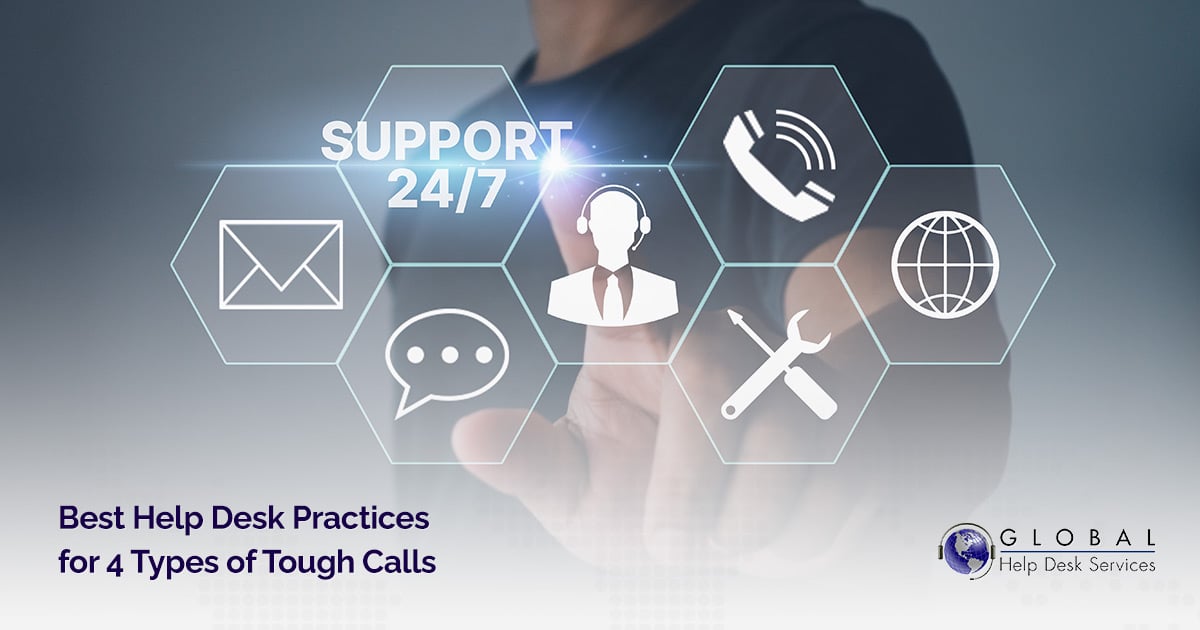In a perfect world, everyone who calls your IT customer service desk would be nice and polite. Problems would be solved instantly, and every caller would cooperate with the help desk agent.
But we don’t live in a perfect world. In the real world, most callers are frustrated. Or they’re not sure what they’re doing. Or they leap ahead of the instructions and make the problem worse.
So, even when an IT help desk user isn’t at their best, how can you turn the situation around? Here are some of the situations you might encounter, and how to handle them.
Types of Tough Help Desk Calls and How to Handle Them
The Caller is NOT Tech-Savvy
These callers may struggle with terminology like “start menu” or “URL,” making it difficult for IT help desk agents to help them with their current issue … because they’re too busy educating them on the basics.
Why This Is a Problem: Bringing a caller up to speed on the basics before even getting to the problem will inevitably lead to longer call times, extended ticket close times, and longer hold times for the rest of the callers in the queue.
How to Handle It: Callers are human, but so are agents. It’s understandable to feel frustration when someone doesn’t understand basic terms. And in a call center, your agent can’t go over to their desk and reset their password themselves.
But getting angry will only make the caller upset and unable to focus on the task at hand. So, it’s important for agents to remain patient. An experienced agent with high emotional intelligence will be able to put aside any annoyance to help guide the caller through solving the problem. Providing clear instructions and simplifying technical language will help the caller fully understand what they need to do to fix the issue while improving their understanding and comfort level over time.
Read more: IT Help Desk Hiring Practices to Get Your Boss off Your Back
The Caller Is “Something of a Tech Whiz Myself”
Despite calling an IT help desk, these callers think they’re the experts and don’t need the agent’s input. They don’t follow instructions, and then blame the agent when the issue isn’t resolved.
Why This Is a Problem: The agent often feels obligated to try the caller’s suggestions – delaying the correct SOP and solution, resulting in a much lengthier call.
How to Handle It: An experienced agent will affirm the caller’s knowledge (“You know what you’re doing, but let me show you this neat trick”) while gently guiding them through the correct next steps, ensuring they feel heard, respected, and like a partner in the solution.
The Caller Won’t. Stop. Clicking.
This caller is eager to get the problem solved but doesn’t look before they leap ahead, erratically clicking on every button, window, or pop-up ad they see instead of following the agent’s suggestions.
Why This Is a Problem: They create more distractions for themselves and the agent. They might have a hard time following directions while dealing with everything on their screen. And if an agent is remoting into their computer, they can’t control the screen. Plus, an already-slow computer will have to work twice as hard to process all the windows they’ve opened.
How to Handle It: The agent should calmly ask a closed-ended question (one with a yes or no answer that doesn’t allow for rambling) that makes them think. A question like “Can I have your PC number?” will interrupt their clicking as they search their mind for what a PC number is and where to find it. They’ll need to stop what they’re doing and refocus to answer.
The Caller Is FURIOUS
This is the type of caller that sinks every help desk agent’s stomach. They’re angry from the start and they’re ready to blame (and yell at) the agent, no matter what. What’s worse, this is getting more common: A 2022 study showed that 43% of customers have yelled at a customer service representative, up from 35% in 2015.
Why This Is a Problem: An angry caller isn’t going to be able to focus on quickly resolving the issue. And if they land on an agent without the right training and temperament to de-escalate the situation, things can get ugly quickly. Now, no one’s thinking about a solution, just their anger.
How to Handle It: The first step is to de-escalate the situation. We call it “Don’t get hooked.” An angry caller might throw out insults to try to get the agent as angry as they are. A well-trained agent won’t bite at the hook by taking the anger personally, and will instead use helpful tools to diffuse the situation, such as:
- Showing empathy and respect: People just want to feel heard. The caller wants to know someone understands them and is willing to help them. Stepping into their shoes to understand why they’re frustrated can go a long way.
- Keeping emotions in check: A well-trained agent can put their negative feelings aside to focus on the problem.
- Take ownership of the solution: If a caller is already frustrated that a problem hasn’t been solved, the last thing they want is a runaround with multiple agents. So even if an agent needs to involve a Level 2 or Level 3 agent, they should assure the caller that they will remain their point of contact throughout the process.
- Offer options: Offering options puts the power back with the caller. It also forces them to stop and consider their options, which will calm them down.
- Express thanks for input: It shows respect for the caller and establishes trust, so they are more likely to listen to the agent’s feedback and follow the steps necessary to solve the problem.
- Follow through and follow up: Owning the solution requires that the agent follow through with anything they promise to do and check back in with the caller to ensure the problem is solved.
Read more: Four Ways to Improve Help Desk Performance With Better Communication
Best IT Help Desk Practices for Difficult Callers
No matter what kind of difficult calls your help desk gets, your agents will need to know some of these tactics to handle them.
Help Desk Customer Service Training
Robust training should include gaining and keeping control of the call, active listening, and de-escalation techniques.
Communicate Clearly and Use the Caller's Name
Agents should build rapport and trust by clearly explaining actions being taken, repeating back issues for clarity, and addressing the caller by name to personalize the interaction.
Set and Manage Expectations
Agents should inform callers about the next steps, who will be handling their issue, and realistic timelines to prevent misunderstandings and frustration.
Maintain Agent Well-Being
Agents are human. Support them with strategies to help them not take interactions personally, emphasizing the role of empathy and resilience in dealing with challenging situations.
The Impact of Trained Agents on Your Business
If you’re a business owner, you might not worry about a couple of angry callers.
But you should. Bad news travels fast.
Customers tell an average of nine people about a good customer experience, but a whopping 16 about a bad one. So, for every bad call, you can expect 17 bad impressions of your help desk. After a while, callers might start going elsewhere.
Tough calls come with the territory, so it’s vital to make sure your IT help desk agents can handle these calls – and callers – with skill.
A Case Study: How a Global Cosmetics Brand Transformed Their Help Desk
Before coming to us, one global cosmetics company had hold times so long users would take screen grabs to show how long they were waiting.
Read about how we helped them turn bad customer service around, slashing hold times and increasing customer satisfaction.
Ready to harness the power of well-trained customer service desk agents for your help desk? Give us a call. We’d love to chat.



